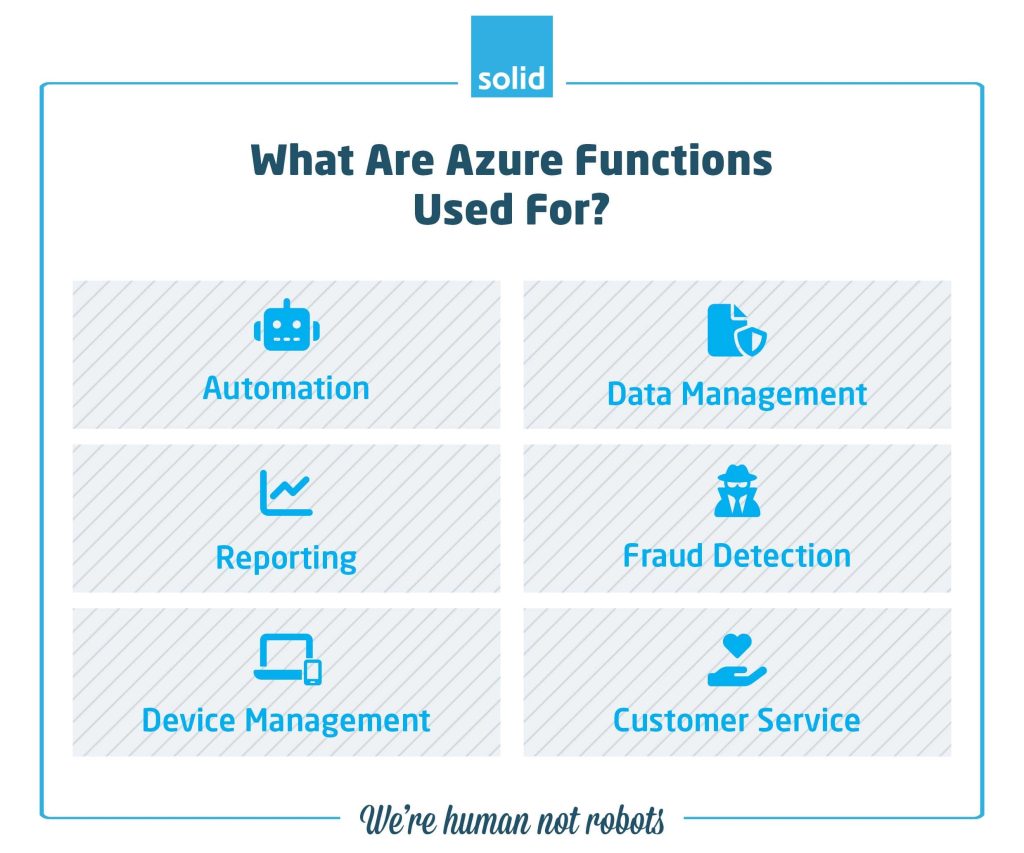
Everyone and their aunt is trying to find new and smarter ways of working to free up their time and make small and meaningless tasks a thing of the past. These admin-filled chores need to be done, of course, but do they need to be done by a human? Are there tools that can automate the process, giving you the time you need to focus your efforts on more important projects?
Azure Functions is one such tool, and you could be using it to streamline your operations and automate day-to-day tasks like processing data, analysing information, supporting your customers, and reducing your overall risk.
What Is Azure Functions?
You may have heard of Microsoft Azure before – a cloud computing platform that provides cloud storage, backup and recovery services, cloud hosting, virtual machines and more. But what is Azure Functions, and why should your business be taking advantage of it?
Azure Functions is an environment for running code and scripts without needing to maintain a dedicated server for them. It connects to your data and apps and let you automate processes, send notifications, analyse information and more, all without it impacting your resources. Where it can be slightly confusing is that on top of Azure Functions as a platform, there are also functions within Azure Function. What is an Azure function? Well, that refers to the piece of code or the script that you’re running in and of itself.
What Are The Benefits Of Using Azure Functions?

There are a number of benefits that companies can gain from using Azure Functions, not least of all is the time that you can save thanks to automation. And while in the past the tool has mostly only been useful for developers, the fact that platforms like ChatGPT have made it easier for absolutely anyone to generate useful code and scripts makes using Azure Functions even more beneficial, even for businesses that don’t have a developer on staff.
• You Can Use A Number Of Different Languages
Whether you’re used to developing in C#, F#, Java, JavaScript, TypeScript, Python or PowerShell, Azure Functions will work well for you. The fact that it supports so many languages makes it easy to implement into your tech stack.
• Resources Are Scalable And Easily Upgradable
With Azure Functions, you don’t need to worry about managing resources. They are scaled up and down automatically according to the needs of the process that you’re running. And if you ever need upgrade, it can be done quickly and easily without impacting your existing infrastructure
• Functions Can Trigger As An Event Happens
Because you can connect Azure Functions to your existing data and apps, it’s easy to automate processes that trigger when something happens to that information or in those apps, like data being uploaded, a threshold being reached, or a date being reached.
• No Need For Infrastructure And Zero Maintenance
Azure Functions runs on Azure’s infrastructure, not your own. This means that you’re able to run scripts and pieces of code, all without an extra load on your servers, network and hardware, ensuring no interruption to your operations.
• Easily Communicate With External API’s And Databases
You can connect to Azure Functions to the tools and apps that your business is already using, providing maximum value with minimum additional expenditure.
What Are Azure Functions Used For?

Now that you have an idea of the benefits of Azure Functions, let’s take a look at the practical side of the tool with some examples of functions and what they can be used for. Whether you’re offering financial services or selling power tools, are an SME or a corporation, Azure Functions has the potential to add value for your business.
• Automation
One of the biggest benefits of Azure Functions is the potential it has for automation. It can, for example, send out notifications to you and your teams when specific events take place – when your systems are running low on memory or CPU, when your inventory of stock needs to be replenished, or when you get mentioned in social media posts even without your company page being tagged.
But the uses for automation are not only internal. You can, for example, run a script that sends your clients emails on their birthdays based on the information that you have in your database. You could compile a list of common questions that you get asked, and the answers to them, and run a script on your website so that when a potential client asked those questions they received the answer in a chatbot. And this is just the tip of the iceberg. There are more on the ways you can use Azure Functions to improve your customer service to come.
• Data Management and Processing
Whether it’s consolidating your files onto a single platform and moving new files that are created or uploaded onto that platform automatically, or it’s converting images and documents into your preferred format as a standard, Azure Functions is there to help. For example, you may want to move all files that are uploaded to Microsoft OneDrive onto Microsoft SharePoint as well to ensure that the two platforms are working in sync. If you’re wanting to boost your data integrity by validating it, managing versions, or applying relevant tags to confidential information, Azure Functions is the tool you need. And if you are wanting to manage your backups more effectively, archiving older information to a more cost-effective Azure storage solution, for example, or taking snapshots of your data at regular intervals, this is another area where Azure cloud functions can save you time and effort.
• Reporting
It is always difficult to gain a thorough understanding of business data, simply because of the sheer volume of information that companies gather on a daily, weekly, monthly and yearly basis. It can both time-consuming and resource-intensive when processed on your own infrastructure. But when you’re integrating Azure Functions into your workflow, its Artificial Intelligence (AI) engines are able to automatically analyse that data quicker and more effectively, all without causing any interruptions to your workflow. You can even schedule your data analysis for regular intervals, like the end of each month or quarter.
• Fraud Detection
If you are working in the Finance industry, then you have a deep understanding of how important it is to detect fraudulent activity as soon as possible to ensure that your own business and your customers’ funds and information are protected. Thankfully, tools like Azure Functions can be a big help in preventing fraud, and even in safeguarding businesses that aren’t financial service providers, by analysing behaviour patterns and alerting you to unusual activity within client accounts as well as the apps and cloud services that your company uses.
• Device Management
When you’ve got a full team of humans working for your company, managing their devices is just as important as managing your business hardware and infrastructure. But the rise in remote and hybrid working has made this more difficult, since often your humans are using their own devices (rather than company-owned and managed laptops or desktops) to access the company’s tools, services and data. This makes it more difficult to keep track of which devices are being used, which versions of software they are running, and how well protected they are against malware and viruses, which is one of the reasons that companies around the world are putting strict Bring Your Own Device policies in place to better manage their hybrid and remote workforces’ expectations and responsibilities. Azure Functions’ device management and data handling capacity makes this far easier to manage, as you can easily set up scripts that check for software versions and firmware updates on devices, and schedule notifications to be sent to your team whenever maintenance is needed, rather than having to keep track of the devices manually.
• Customer Service
There are plenty of ways that a tool like Azure Functions can boost your business’ customer service. I already mentioned the potential for it to, for example, send out reminders to your teams, or even emails to your clients directly, to wish them a Happy Birthday – a small gesture that can go a long way towards building a good and human relationship with your clientele. But there is so much more possibility.
Imagine, for example, the frictionless process that you can provide as an ecommerce store whenever your clients request new services. You can send them an SMS immediately to show them that their order has been received, and when it’s packaged and shipped. You can provide specialised discounts based on their previous purchases, showing that you are not only paying attention to their orders, but encouraging them to come back again and again, building that relationship with them further each and every time.
If it’s a service that you’re selling, rather than a product, you can use Azure Functions to onboard your clients in the right way, personalising it to their services, their needs and requirements to ensure that they are introduced to the value that your business offers in the right way, and are set up for success. The potential really is endless.
Where Does Solid Systems Come In?
You’ve got a good idea of what Azure Functions does and how it can be used. But what about Solid Systems? Where does our role come in?
As a Managed IT Services provider, we have spent the past 20 years finding new and unique solutions to meet our client’s needs and help them to meet their goals. And Azure Functions is exactly the kind of solution that we love to see our customers implement. It can help them in so many different ways, and especially in the age of Chat GPT and AI, there is so much untapped potential for businesses to further their operations. It’s these kinds of Microsoft 365 and Microsoft Azure tools that we love helping clients to adopt and adapt to their unique needs. So if Azure Functions is the kind of platform that you think would be valuable to your company, we are the kind of IT partner that you need by your side, helping you to make the most of Microsoft solutions like Azure Functions and so much more.
Are you a business with 15 or more team members who sees the value in adopting the right technologies in the right way? Don’t wait any longer. Schedule a free consultation with our Sales team today.
Frequently Asked Questions (FAQs)
Azure Functions is designed to handle various different types of code requests, scripts and commands. This means that there are a number of functions that it can process. Some of the most commonly used Azure function types include:
- HTTP Triggers are useful in creating custom APIs that integrate with a number of different apps and platforms.
- Timer Triggers allow you to schedule functions to process when a particular action takes place, or at a particular time. These functions are particularly useful for reporting and sending out notifications when a predetermined limit is reached or when unusual activity is detected.
- Blob Triggers are particularly useful for companies that use Azure’s Blob Storage, as it can manage image processing, file formatting, backups, and moving older data into an Archive structure seamlessly.
Azure Functions isn’t restricted to a single programming language. It allows for so many different popular language options that it can be easily adapted into any developers workflow. And with the rise in AI tools like Chat GPT, it is easier than ever before for even someone who is not familiar with programming to build a script for Azure Functions to run, even if your business doesn’t have a developer on staff.
While this list isn’t exhaustive, Microsoft Azure does accommodate many of the most popular programming languages including:
- C#
- F#
- Java
- JavaScript
- TypeScript
- Python and
- PowerShell
While both Functions and App Service are Microsoft Azure tools, they are designed to meet very different needs. Where Azure Functions is all about serverless cloud computing, providing a platform for your business to run code and scripts without it impacting your existing infrastructure and resources, Azure App Service is focussed on the development, deployment and management of web apps. With App Service, you still need to run and maintain your own infrastructure, though it does provide a number of scalable and affordable options that you can make use of.





